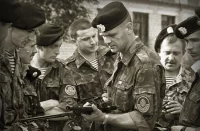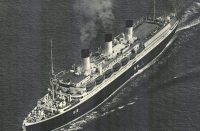
On July 28, 1942 Stalin issued his famous order no. 227: “Not one step back!” And this was not because he had forgotten to do it in 1941, but because the state of affairs on the front lines of the war had become much more dangerous and the prospect of a Soviet military defeat seemed far more possible than it had at the beginning of the war. That is why on Oct. 19, 1942, Stalin wrote to the Soviet ambassador in England, Ivan Maisky:
All of us in Moscow have gained the impression that Churchill is aiming at the defeat of the USSR, in order to then come to terms with the Germany of Hitler or Brüning at the expense of our country. Otherwise it is difficult to explain Churchill’s behavior either in regard to the second front in Europe or the arms shipments to the USSR, which continue to dwindle.
The PQ 17 tragedy occurred in early July 1942, and Stalin’s telegram was sent in mid-October. In the interval Churchill had sent letters of “explanation,” the British had attempted to scale back the convoys, and Churchill had visited Moscow from August 12-14. As a result – Stalin became convinced, as he expressed in his telegram to Maisky, that Churchill was conspiring with Hitler.

You can judge for yourself the feebleness of Sir Winston’s “explanations” about the PQ 17 tragedy by reading the correspondence of the two leaders in its entirety, so we’ll just offer the highlights here. The British prime minister’s entire letter to Stalin on July 18, 1942 can be boiled down to one sentence: we cannot fight the Germans, because it will cost us dearly. And therefore, writes Sir Winston, we have no choice but to end the convoys to the USSR. Stalin’s letter of response on July 23, 1942 sheds a clarifying light on what was happening at that time:
I have received your message of July 18. I gather from the message, first, that the British Government refuses to go on supplying the Soviet Union with war materials by the northern route and, secondly, that despite the agreed Anglo-Soviet Communique 20 on the adoption of urgent measures to open a second front in 1942, the British Government is putting off the operation till 1943.
According to our naval experts, the arguments of British naval experts on the necessity of stopping delivery of war supplies to the northern harbours of the U.S.S.R. are untenable. They are convinced that, given goodwill and readiness to honour obligations, steady deliveries could be effected, with heavy loss to the Germans. The British Admiralty’s order to the P.Q. 17 convoy to abandon the supply ships and return to Britain, and to the supply ships to disperse and make for Soviet harbours singly, without escort, is, in the view of our experts, puzzling and inexplicable. Of course, I do not think steady deliveries to northern Soviet ports are possible without risk or loss. But then no major task can be carried out in wartime without risk or losses. You know, of course, that the Soviet Union is suffering far greater losses. Be that as it may, I never imagined that the British Government would deny us delivery of war materials precisely now, when the Soviet Union is badly in need of them in view of the grave situation on the Soviet-German front. It should be obvious that deliveries via Persian ports can in no way make up for the loss in the event of deliveries via the northern route being discontinued.
As to the second point, namely, that of opening a second front in Europe, I fear the matter is taking an improper turn. In view of the situation on the Soviet-German front, I state most emphatically that the Soviet Government cannot tolerate the second front in Europe being postponed till 1943. I hope you will not take it amiss that I have seen fit to give you my frank and honest opinion and that of my colleagues on the points raised in your message.

During Churchill’s visit to Moscow a few days later, Stalin would tell him quite pointedly, “The Germans do not have a large fleet, and it needs to be destroyed, rather than scattering the convoys.” Stalin knew who he was dealing with. He knew who had raised Hitler to power and the reason for that. He understood that England’s ultimate goal was to drag out the Soviet-German war for as long as possible. This was why he was so affronted by the excuse of these “circumstantial factors” that his “allies” were forced to send the PQ 18 convoy to the USSR in early September 1942. Interestingly enough, the military escort ships accompanying the PQ 18 convoy were also ordered to focus on protecting themselves, rather than the supply vessels. (Paul Lund, PQ17: Convoy to Hell). But this time that order was ignored, and the British sailors successfully safeguarded the transports. The fact that the PQ 17 could have been protected is also evident from the fact that despite a fierce battle in the Barents Sea north of North Cape, 28 out of 41 vessels of the PQ 18 arrived safely in Soviet port, causing a dramatic loss to Luftwaffe (around 40 aircrafts piloted by the best German aces were hit by the escort during the voyage).
The history of the PQ 17 is only a small fragment in the mosaic of the elaborate games that the British establishment employed during the Second World War to achieve its elusive goals. To that end they sacrificed their own citizens and soldiers. For example, as part of the Operation Fortitude campaign of disinformation in the first half of 1944, British intelligence sent agents into various countries of occupied Europe who, for one reason or another, “knew” the place and time of the Allied landing in Europe. According to the information they provided, that landing was to occur in Pas-de-Calais. The directors of the operation also saw to it that these agents fell into the hands of the Gestapo and that the poison capsules they were given to use in the event of their arrest turned out to be worthless. But the evidence of those suicide attempts would make the information that the Gestapo obtained by torturing the captured agents seem more reliable. As a result, the credulous Germans were awaiting the Allied landing in entirely the wrong place. Moreover, after Allied troops stormed the beaches at Normandy, Hitler, who was expecting a landing in Pas-de-Calais, failed to move several tank divisions south that would have been capable of repelling that invasion.
And what about those unfortunate agents? Some of them survived the war, and, realizing what had happened to them, demanded an investigation. But, like the logs of the arctic-convoy radio cables, the archive of the Special Operations Executive had been destroyed just in time. In response to attempts to discover what really happened, the British government has donned an expression of affronted dignity. They claim that such a course of action would have been beneath them and they are outraged by the very suggestion.
No documents exist. That means it never happened …
The presented text was taken from the book by the Russian historian, writer and political activist Nikolay Starikov “Proxy Wars“, St.Petersburg, 2017. Adapted and translated by ORIENTAL REVIEW.
Reposts are welcomed with the reference to ORIENTAL REVIEW.
PREVIOUS EPISODES
Episode 17. Britain – Adolf Hitler’s star-crossed love
Episode 16. Who signed death sentence to France in 1940?
Episode 14. How Adolf Hitler turned to be a “defiant aggressor”
Episode 13. Why London presented Hitler with Vienna and Prague
Episode 12. Why did Britain and the United States have no desire to prevent WWII?
Episode 11. A Soviet Quarter Century (1930-1955)
Episode 10. Who Organised the Famine in the USSR in 1932-1933?
Episode 9. How the British “Liberated” Greece
Episode 7. Britain and France Planned to Assault Soviet Union in 1940
Episode 6. Leon Trotsky, Father of German Nazism
Episode 5. Who paid for World War II?
Episode 4. Who ignited First World War?
Episode 3. Assassination in Sarajevo















Pingback: Episode 18. How Britain assisted the Soviet Union’s fight against Hitler (II) – OrientalReview.org
It’s been a while.keep those episodes coming!